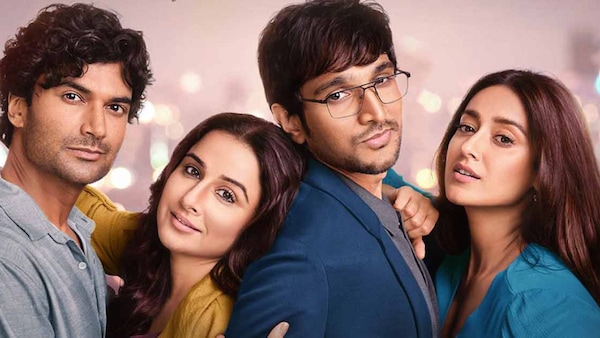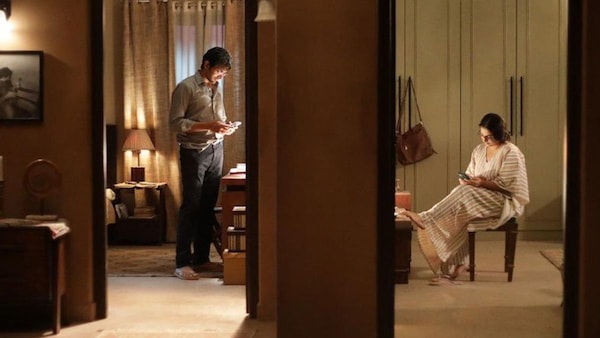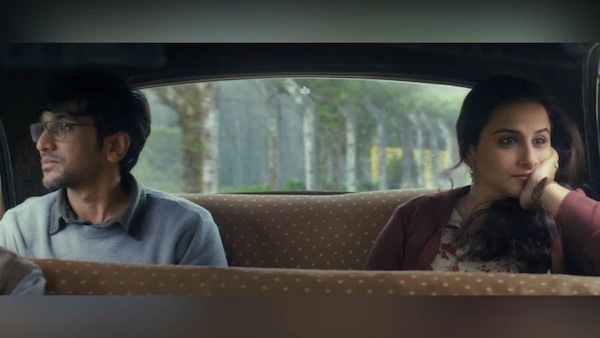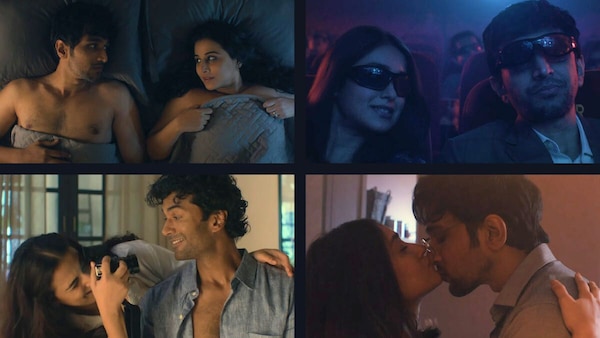Do Aur Do Pyaar Is A Smart, Sly Film About Relationships & Marriage
Shirsha Guha Thakurta's debut film Do Aur Do Pyaar walks the tightrope of love and habit, familiarity and newness, outlining a story about divorce in the cast of love.

Promo poster for Do Aur Do Pyaar.
Last Updated: 11.27 PM, Apr 19, 2024
SHIRSHA GUHA THAKURTA's Do Aur Do Pyaar, a charmingly understated film, shares much with another charmingly understated film, Akshay Roy’s Meri Pyaari Bindu (2017). The obvious comparison is tied to a name: Suprotim Sengupta, a writer in both outings. But in spite — or maybe because of him — it is easy to imagine these two films rooted in a similar universe where the central characters vie for something common: an ideal.
In Meri Pyaari Bindu, a criminally overlooked film about the permanence of first love, the male protagonist fails to get over the one girl he had fallen for when young. Her memories follow him around like a wrong road tied to his feet. He goes through breakups and becomes a successful novelist, all the while remaining hung up on her. The filmmaker and the writers reason for the immobility of his heart by centring the narrative around the man, suggesting lightly that it has less to do with who she is and more to do with who he imagines her to be. In his mind, the girl is elevated to an ideal, inhabiting everything he wants.
The subtext is reiterated in Do Aur Do Pyaar, an official adaptation of Azazel Jacobs’s 2017 film, The Lovers. The premise is the same: an estranged married couple trudge along life by having long-standing affairs. Both the husband and the wife are in love with other people. But, one day an innocent kiss draws them close as they transform into lovers overnight and turn the idea of cheating on your spouses on its head.
The Lovers is a wistfully funny film with pessimistic, if not sad, undertones. Jacob’s story about infidelity relinquishes all grand notions about love. The long-time married couple at the centre of the narrative confirms our worst fears by holding out a mirror to the soul, reflecting what many fear but do not want to believe: love dissipates, if not vanishes, with time. Written by Amrita Bagchi, Eisha Chopra and Sengupta, Do Aur Do Pyaar shares the setting but not necessarily the outlook.
Guha Thakurta’s outing restates the difficulty of retaining love in long-term relationships but offsets the despair by underlining the appeal of such arrangements. Her debut film, imbued with a distinct style, is as much about two people going their separate paths after having journeyed together as it is about the same people choosing to meet again without coming back to each other. It walks the tightrope of love and habit, familiarity and newness, outlining a story about divorce in the cast of love.

Do Aur Do Pyaar shines in the little things, like deftly using seemingly innocuous things to make larger points. Take for instance, the informed decision the makers take to set this tale of fluctuating love in a city that never sleeps: Mumbai. When we meet Kavya Ganeshan (Vidya Balan) and Ani Banerjee (Pratik Gandhi), a couple married for 12 years, there is already a weariness set in their arrangement. This is as much of a narrative requirement as it is an upshot of living in a city that tires one out under the pretext of making space for them. It seems entirely plausible that Kavya and Ani, both professionals, have ceased to fight because their resentment has become jaded, having accrued over all the time the crammed city might have made it impossible to follow through impromptu date plans. Similarly, Kavya’s disappointment with Ani (“you got too involved in work”; “you forgot me”) stems directly from living in a city that constantly demands a piece of you in return for it giving you its share.
Even the kind of people they fall in love with feed into this reading. Ani, a man burdened with responsibility, is in love with Noor (an effective Ileana D'Cruz), an aspiring actress. Although never explicitly stated, it is not difficult to assume that Noor has come to live in Mumbai. The city is still new to her and in this newness, Ani finds a purpose to feel needed. Ditto for Kavya who falls for Vikram (Sendhil Ramamurthy in a welcome Hindi film appearance after Shor in the City in 2011), a globe-trotting photographer. With his profession to offer up as proof, he looks at her with more intent and care than her husband does. An NRI, he also struggles with Hindi which she lovingly corrects, recreating something she perhaps shared with her Bengali husband in the early years of companionship.
Being with these people allows the central characters to retain their old self and don a new version of themselves. For instance, Kavya’s insecurity about her age and achievements are abated with Vikram who did not know her from before. Ani’s hypochondria (in a telling touch, his bedside table is filled with homeopathic medicines) and past ambitions (he wanted to be a singer) do not rear their head with Noor, a budding actress who is following her passion. He helps her out with auditions to live vicariously. When the film opens, Kavya and Ani are neck-deep invested in their respective partners, and while each remains unaware that the other is cheating on them, it seems to not matter. Their marriage has reduced to conversations about garbage bags and medicines, making the external arrangement where they both can be grateful for being guilty, perversely functional.
Again, none of these things are overtly stated but Do Aur Do Pyaar is an arrestingly smart film that resists undermining the intellect of its characters and those watching them. Equal care is taken in choosing the event that revives the sparks: a family tragedy. As Kavya meets a divorce lawyer and Ani rehearses a break-up speech, with their partners dialling up the need for a decision, her grandfather dies. Guha Thakurta slyly subverts the obvious sentimental repercussion of such an event by using it as a segue to relive the past. Both fly down to Ooty, Kavya’s hometown where their love story had birthed.

The trip bears some expected results: Kavya and Ani sleep in the same bed where they had probably shared space for the first time. They go to the pub from where they had eloped many years ago (there is a crackling scene here when both drunk-dance to 'Bin Tere Sanam' – a song brimming with lover’s despair). Familiarity breeds fondness. But something else happens too. Kavya’s Tamilian parents, her docile mother and unyieldingly conservative father come into the picture and lend a sweeping context to her love and life story. Having grown up in a house where she felt unseen (Kavya’s father reminds her that in a family of generational doctors, she is just a dentist) falling for a boy whom her family would not approve of was her language of rebellion.
It also makes sense why she and Ani hadn’t divorced yet and why they were on the brink of it. With their arrival in Ooty, the first time since they had run away, they realise that their story has assumed a mythical status. All her relatives are curious about it and everyone has a version. With the stakes so high (they had a point to prove), their love had become hostage to a story and the same story prevented them from severing ties. But in the sight of familiar opposition, it also starts moving a lot like love.
There is also something wonderful Guha Thakurta does to denote and calibrate proximity. In the beginning, when we meet Kavya and Ani as distant partners, they refer to each other by their names. Once they share a kiss in Ooty, an act that reintroduces them as sexual beings to each other, they start calling each other by their surnames. Like young lovers. In their mouths, ‘Ganeshan’ and ‘Banerjee’ sound more like a tease, a prolonged foreplay before the culminating act. Later, in Mumbai, they flirt over posto (poppy seeds) and use Chinese food as a metaphor of sex. These little instances gently underscore that when love leaves, the first thing to vanish is the private language between lovers.

Both Balan and Gandhi are smashing in these scenes, conjuring palpable chemistry from nothing. The actors are exceedingly watchable together and can even enliven silences with their eyes. There is also something to be said about Gandhi’s penchant for physical comedy (there is a hilarious scene where he creates a make-believe scenario of playing football over the phone) that appears to be only getting better with each appearance.
A lot happens in Do Aur Do Pyaar, a film inherently about infidelity and the impracticability of remaining in love over long stretches of time. It is a tragic proposition and while it does not undercut this, the feature also goes ahead and seeks to examine it. As the narrative gets more mired in the confusion of feelings, a common question accompanies the proceedings: what are we searching for when we search for love? Is it some far-flung ideal that promises to make us feel better about ourselves? Or, is it a sense of familiarity that comforts even when the tingling newness of love exists from the door? Would the protagonist in Meri Pyaari Bindu be eternally happy if he was loved back by the girl he could not stop loving? Does everything make sense if one person does? Do Aur Do Pyaar does not pretend to have all the answers except for one: the quest for love is an act of looking for ourselves.

 Premium
Premium